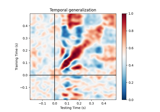mne.decoding.Scaler¶
- class mne.decoding.Scaler(info=None, scalings=None, with_mean=True, with_std=True)[source]¶
Standardize channel data.
This class scales data for each channel. It differs from scikit-learn classes (e.g.,
sklearn.preprocessing.StandardScaler) in that it scales each channel by estimating μ and σ using data from all time points and epochs, as opposed to standardizing each feature (i.e., each time point for each channel) by estimating using μ and σ using data from all epochs.- Parameters
- infoinstance of
Info|None The measurement info. Only necessary if
scalingsis a dict or None.- scalings
dict,str, defaultNone Scaling method to be applied to data channel wise.
if scalings is None (default), scales mag by 1e15, grad by 1e13, and eeg by 1e6.
if scalings is
dict, keys are channel types and values are scale factors.if
scalings=='median',sklearn.preprocessing.RobustScaleris used (requires sklearn version 0.17+).if
scalings=='mean',sklearn.preprocessing.StandardScaleris used.
- with_meanbool, default
True If True, center the data using mean (or median) before scaling. Ignored for channel-type scaling.
- with_stdbool, default
True If True, scale the data to unit variance (
scalings='mean'), quantile range (scalings='median), or using channel type ifscalingsis a dict or None).
- infoinstance of
Methods
__hash__(/)Return hash(self).
fit(epochs_data[, y])Standardize data across channels.
fit_transform(epochs_data[, y])Fit to data, then transform it.
get_params([deep])Get parameters for this estimator.
inverse_transform(epochs_data)Invert standardization of data across channels.
set_params(**params)Set the parameters of this estimator.
transform(epochs_data)Standardize data across channels.
- fit(epochs_data, y=None)[source]¶
Standardize data across channels.
- Parameters
- Returns
- selfinstance of
Scaler The modified instance.
- selfinstance of
Examples using
fit:
- fit_transform(epochs_data, y=None)[source]¶
Fit to data, then transform it.
Fits transformer to epochs_data and y and returns a transformed version of epochs_data.
- Parameters
- Returns
- X
array, shape (n_epochs, n_channels, n_times) The data concatenated over channels.
- X
Notes
This function makes a copy of the data before the operations and the memory usage may be large with big data.
Examples using
fit_transform:
- inverse_transform(epochs_data)[source]¶
Invert standardization of data across channels.
- Parameters
- epochs_data
array, shape (n_epochs, n_channels, n_times) The data.
- epochs_data
- Returns
- X
array, shape (n_epochs, n_channels, n_times) The data concatenated over channels.
- X
Notes
This function makes a copy of the data before the operations and the memory usage may be large with big data.
Examples using
inverse_transform:
- set_params(**params)[source]¶
Set the parameters of this estimator.
The method works on simple estimators as well as on nested objects (such as pipelines). The latter have parameters of the form
<component>__<parameter>so that it’s possible to update each component of a nested object.- Parameters
- **params
dict Parameters.
- **params
- Returns
- instinstance
The object.
- transform(epochs_data)[source]¶
Standardize data across channels.
- Parameters
- epochs_data
array, shape (n_epochs, n_channels[, n_times]) The data.
- epochs_data
- Returns
- X
array, shape (n_epochs, n_channels, n_times) The data concatenated over channels.
- X
Notes
This function makes a copy of the data before the operations and the memory usage may be large with big data.
Examples using
transform:
